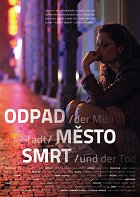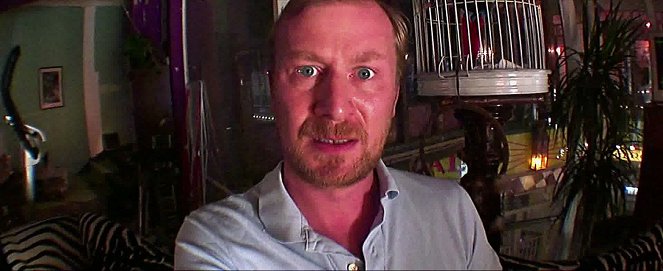Regie:
Jan HřebejkMusik:
Ivan AcherBesetzung:
Gabriela Míčová, Jiří Černý, Martin Finger, Stanislav Majer, Martin Pechlát, Dana Poláková, Anna Polcarová, Štefan Chovanec, Tereza BebarováInhalte(1)
The screenplay (Der Müll, die Stadt und der Tod) by Rainer Werner Fassbinder inspired a theatre production by Dušan Pařízek. The screenplay and the production in turn inspired the film ODPAD MĚSTO SMRT (Waste, City, and Death) by Jan Hřebejk. Romi, a prostitute, is anything but successful at her job: she is of far too gentle a nature for her clients. The more obstinately she is pushed to the streets by her pimp Franz, the closer she is to a complete breakdown. One day Romi is addressed by a property speculator referring to himself as a "wealthy Jew." He does not demand any sexual services of her. He satisfies himself with Romi telling him stories, for which he lavishly rewards her. However, no one shares the sudden happiness with Romi. Her work-mates and current clients turn their backs on her, as does Franz, with whom Romi is in love. The whole story takes place in the setting of a dilapidated city, during the clean-up of which politicians openly split their profit with speculators and lobbyists, all under protection from the police. (Verleiher-Text)
(mehr)Kritiken (5)
Die Stadt als Abfall, Langeweile und Tod. Das Libretto sieht sehr schön aus, ich mag die Schauspieler. Ich habe den Minimalismus der Komödien-Szene sowie eine stärkere Einbeziehung der opulenten Szene des Films gemisst. Ein paar einfallsreiche Momente gab es, auch eine ausgefeilte Kamera, Manierismus. Jedoch hauptsächlich Worte, Worte, Worte - nette, vulgäre, deprimierend, entfremdet. Der Film fügt ein sprichwörtliches glänzendes wenig hinzu, Fassbinder schwimmt im Lichte sowie in veränderlicher Zivilheit / Stilisierung bestimmter Stimmen. Am Ende gewinnt dieses seltsame Theater Oberhand gegen die Absicht, im Stück eine packende Filmdimension in Form eines Drehbuchs zu finden. Dies ist einfach eine gute Produktion, umgesetzt in stilisierte Locations von Prag unter freiem Himmel / Innenräume, von denen es manchmal sehr viele gibt und die eher die den Schauspielern und Repliken gewidmete Aufmerksamkeit fragmentieren. Nichts mehr.
()
I haven't seen this in the theater, but because I am well-read in Fassbinder, I understand that he wanted to settle things with the German bourgeoisie, the establishment that never fully separated itself from its war past during Fassbinder's short life, with all the conformists against whom the left-wing agitator defined himself. Thinking about it, he was bothered by everything and everyone. With knowledge of German history, everyone probably understands why a big Jew appeared in the play, and with awareness of Fassbinder's sexual orientation, you will understand why his characters have such complicated sexuality. However, this context is lost when the play is transferred to the Czech environment, and what remains is a clumsy attempt at great art. I also have a fundamental problem with Gabriela Míčová. Her prostitute Romi, at least as I understand her, was supposed to be in the midst of those selfish monsters, the only human being who allows herself to be exploited by others, and one should feel at least some sympathy for her. I don't know if it's her acting or if her personality has this effect on me, but she seems just as repulsive or unsympathetic to me as the rest of that strange gathering. Overall impression: 25%.
()
I’m glad that Czech cinema is doing something other than the norm, but it still somehow needs to rape Fassbinder and Lucerna. So we get Wenceslas Square in a slightly different light and Lucerna in the most traditional light. It has its moments, Pechlát as a tranny singing is one of the funnier moments, but then it goes downhill. Stereotypes about Jewish machinations and their gay hustlers belong to a borrowed environment and Prague doesn't correspond to that as much as Berlin might, for example. I also have absolutely no problem with Gabriela Míčová's performance, because I still have a vivid memory of her fiasco in other works and this was not all that different.
()
Ein absoluter Leckerbissen, ich weiß nur nicht, ob ich eine Film- oder eine Theaterkritik schreiben soll. Ich habe die Vorlage nicht gesehen, was in meinem Fall immer ein großer Vorteil ist, denn ich bin bei Filmadaptionen von Theaterstücken unglaublich kritisch und fast nie zufrieden. Hřebejks Leistung aber sehe ich als eine Art Verehrung, einen Ausdruck von Bewunderung Respekt der Arbeit von Dušan Pařízek und seinem Ensemble an. Das erste riesige Plus ist ein tolles Drehbuch voller gepfefferter Sätze und schöner, trauriger Gedanken. Das Zweite Plus sind die exzellenten Leistungen eines eingespielten Darstellerteams, angeführt von Gabriela Míčová. Das dritte Plus besteht in der Gesamtschilderung der Atmosphäre, so hatte ich das Gefühl, dass ich direkt in die Handlung, in die Zeit einbezogen bin. Ich bin über alle Maßen zufrieden. Und ich schließe mich der sachlichen und wiederholten Rüge der Prager Ratsherren an, die zugelassen haben, dass ein solch außerordentliches Ensemble aufgelöst wird. Das Theater Dejvice hat so in Prag seinen einzigen relevanten Konkurrenten verloren.
()
It's not a pretty film and it's not easy to watch, as it has more of a theatrical feel, which generally bothers me in movies. However, the performances are so good that I just watched their dialogues, which are not without substance, and the relationships are well captured, even if they seem somewhat exaggerated. Good movie.
()

